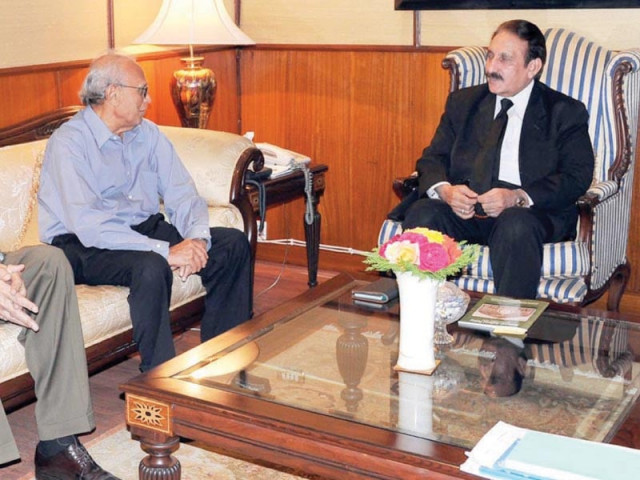1990 pre-poll rigging: SC verdict could fuel political anarchy, warns poll chief
Questions timing of judgment, says it could stoke clash between political parties.

Chief Election Commissioner Justice (retd) Fakhruddin G Ebrahim on Monday expressed serious concerns over the timing of the Supreme Court’s verdict over what is referred to as the Asghar Khan petition.
“A decision at this time can result in a clash between political parties. It might affect the course of the next elections,” the country’s poll chief told The Express Tribune. Last week, the apex court released a short-order maintaining that intelligence agencies had distributed money among politicians in a bid to influence the results of the 1990 elections – an order that was widely hailed.
“It happened in 1990. Now, the judgment has left everything in a shambles,” said Ebrahim, adding the move will not bode well for a smooth political transition.
Earlier, Ebrahim appeared to be even more concerned about the implications of the verdict when he told BBC Urdu that the decision would fuel political “anarchy.”
“The case has been pending for the last 16 years, but the court has given its decision now. I think it would add to the political anarchy in the country … it certainly won’t do any good,” the BBC quoted Ebrahim as saying.
When asked about the veracity of these comments, Ebrahim admitted he did say that. “Yes, this is correct. I believe so … I have said this.”
Ebrahim also held a meeting with Chief Justice of Pakistan Iftikhar Muhammad Chaudhry earlier in the day. However, he said the two discussed other pressing issues and the court’s verdict was not deliberated over. Ebrahim added he would discuss the matter with Chief Justice Chaudhry in subsequent meetings.
The chief justice told Ebrahim that the National Judicial Policy Making Committee (NJPMC) does not allow the district-level judiciary to take part in the electoral process, as it distracts judges from their primary duty while complaints of corruption tarnish their image.
Upon this, Ebrahim requested the chief justice to review the NJPMC. A statement released by the Supreme Court maintained that Ebrahim had formally requested Chief Justice Chaudhry to allow district and sessions judges to serve as district returning officers in the upcoming parliamentary polls.
He added there was a broad consensus amongst civil society, political parties and media to make the election process more credible.
The chief justice assured Ebrahim of taking the proposals into consideration during the NJCPMC’s next meeting on November 3.
Talking to journalists before his meeting with the chief justice, Ebrahim said the Election Commission of Pakistan (ECP) could not take action against politicians accused of having received cash handouts during the 1990 elections.
“We have no constitutional provision to disqualify these politicians,” he said, pointing out that the court had referred the matter to the Federal Investigation Agency (FIA). He further said the ECP decides who fulfills eligibility criterion spelt out under articles 62 and 63 of the Constitution after receiving nomination papers.
Replying to another query, Ebrahim said the ECP has not yet received a reference from the Senate chairman regarding Interior Minister Rehman Malik’s disqualification.
“We can only proceed against him once we receive a disqualification reference against him.”
Published in The Express Tribune, October 23rd, 2012.


















COMMENTS
Comments are moderated and generally will be posted if they are on-topic and not abusive.
For more information, please see our Comments FAQ